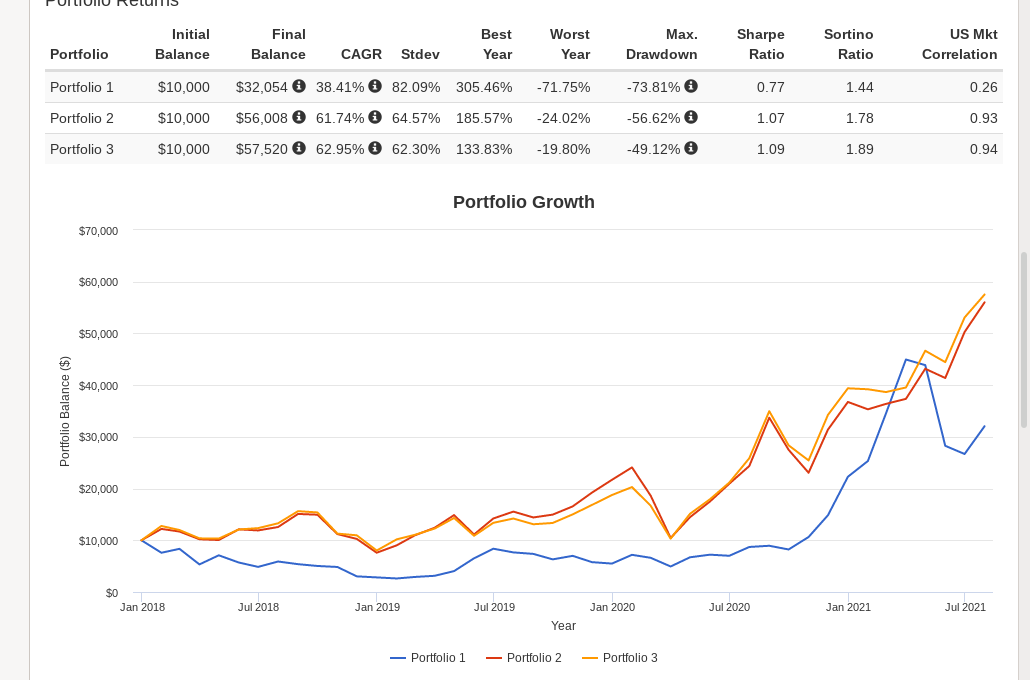If you visit cryptocurrency reddit subs, one thing you may observe is that hardly anyone is making money, for reasons discussed earlier: too much volatility relative to returns, inconsistent gains, exchange hacks, and other reasons.
Turing a $100 deposit in Coinbase into $200 is considered an enviable success in in the world of crypto. It does not matter how much coins may go up, it’s chump change all the way down. Crypto is a lot like fantasy football or poker. These activities have huge communities in which members will gush on about their favorite strategies or their favorite players, but in the end no one is really making any money.
Compare any cryptocurrency sub to /r/wallstreetbets. In the latter is pages upon pages of 5, 6 figure, or higher gains, with a smattering of memes, but the point is, people are actually making tons of money with stocks and options, large losses not withstanding. Traders on Robinhood not uncommonly turn $400 into $10,000 and so on with just some simple bullish options bets on FAANG stocks, which is such an apparent rarity in crypto that it’s enough to launch a successful YouTube career to show others how to make a McDonald’s salary.
Two months ago in the post Why Stocks Beat Crypto, I predicted that Bitcoin’s returns would significantly lag 3x etfs and individual large cap tech stocks, and argued that the latter is a superior investment. Since then, the performance gap has only widened:

The 3x tech ETFs, TECL and TQQQ, in red and yellow, turned $10,000 into $57,000 each (470%), but Bitcoin (^BTC, in blue) only gained 200%. And Bitcoin had a much larger decline, -75% in 2018, vs a 50% decline for the 3x ETFs.
It’s evident by every objective measure that stocks have more consistent, smoother returns (a higher Sparpe ratio), which can be magnified with leverage, such as the use of 3x ETFs like TECL and TQQQ.
It’s been over a decade since Bitcoin was released and still no mass adoption. By comparison, the world wide web was an instant success. Same for Paypal, Google, Facebook, and Ebay. I also predict mass-adoption will never come. Like gold, silver, and other commodities, Bitcoin is just a speculative vehicle and does not offer any way of generating long term value for investors. For this reason, there is no reason to ever choose crypto over stocks unless you are trying to hide assets from creditors, I suppose. Admittedly, there is value and use for an irrevocable medium of exchange, but trillions of dollars? Likely not.
In spite of all the hype, Bitcoin’s performance metrics, such as risk-adjusted returns and draw-downs, since 2018 are worse than even some of the worst hedge funds. If a fund manager used Bitcoin’s performance as a prospectus, they would not be able to raise any money. Even though Bitcoin has stronger year-to-date performance than stocks, Crypto gains hold up way worse than stock gains. When the S&P 500 or nasdaq goes up 3%, those gains tend to hold. The same canot be said for crypto gains, which are as fleeting as the tides. This can explain why Bitcoin has worse risk-adjusted measures and worse returns compared to leveraged index funds such as TECL and TQQQ.
How about Ethereum? It has gained about 2x as much as Bitcoin, but all of its gains come from beta, not alpha, in financial jargon. This means the same risk-adjusted returns.
Using a put option strategy, in a forthcoming post, with data going as far back as 2010, one is able to capture the same upside with TQQQ and TECL but reduce drawdowns in half, effectively increasing the sharpe by a factor of 2^.5, which makes the strategy better than any fund available to the public and even approaching the legendary Renaissance Technologies, but with far fewer trades needed and full transparency.
In fairness, pre-2017 the picture changes completely and Bitcoin is overwhelmingly the winner, but that was likely an outlier that will never be repeated. The total crypto market stands at $1.9 trillion now, so going up another 10x from such a high starting point is much harder, and requires considerably more capital, than going from $15 billion to $300 billion like in 2017. Companies have the advantage of growing earnings exponentially, but crypto does not generate any capital that can justify its valuation. The period from January 2018 to present includes several bull markets and bear markets, and provides in my estimation a useful sample for estimating Bitcoin returns going forward, whereas pre-2017 returns should be treated as an anomaly and excluded for forecasting purposes.
I made enough to retire from buying/selling crypto. The majority of my gains came from buying Solana at ~2 and selling at~40. I mostly got into Solana by copying Sam Bankman. Sam is a genius and was pushing the coin hard so I went in hard.